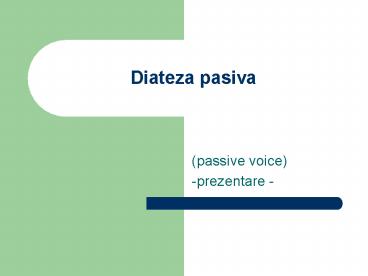Diateza pasiva - PowerPoint PPT Presentation
1 / 15
Title:
Diateza pasiva
Description:
Diateza pasiva (passive voice)-prezentare - formare Fiecare timp are o schema de formare la diateza activa (vezi schemele de la timpurile verbale) si o schema de ... – PowerPoint PPT presentation
Number of Views:23
Avg rating:3.0/5.0
Title: Diateza pasiva
1
Diateza pasiva
- (passive voice)
- -prezentare -
2
formare
- Fiecare timp are o schema de formare la diateza
activa (vezi schemele de la timpurile verbale) si
o schema de formare la diateza pasiva, ce vor fi
prezentate mai jos. - In diateza activa subiectul este cel care face
actiunea.(ex.Mama uda florile). - In diateza pasiva actiunea se rasfrange asupra
subiectului.(ex. Florile sunt udate de mama).
3
observatii
- La absolut toate timpurile verbul este la forma a
treia (cel neregulat) sau cu terminatia -ed
(cel regulat). Ce se schimba pentru fiecare timp
este ceea ce exista intre subiect si verb. - In limba romana exista cel putin 2 modalitati de
a exprima o actiune la diateza pasiva (se va
ilustra la exemple). In limba engleza se respecta
doar schema timpului respectiv. - Simboluri
- Verb forma a treia sau cu terminatia
- -edgt V(III)/ V(-ed)
4
Present Simple
- Afirmativ S am/is/are V(III)/ V(-ed)
- Negativ S am/is/are not V(III)/ V(-ed)..
- Interogativ am/is/are S V(III)/ V(-ed)?
- Ex.
- Lectia este scrisa zilnic./ Se scrie lectia
zilnic. - The lesson is written daily.
- Vasele nu sunt spalate in fiecare seara./ Nu se
spala vasele in fiecare seara. - The dishes arent washed every evening.
5
Present Continuous
- Afirmativ S am/is/are being V(III)/
V(-ed) - Negativ S am/is/are not being V(III)/
- V(-ed)
- Interogativ am/is/are S being V(III)/
V(-ed)? - Ex.
- Lectia este scrisa acum./ Se scrie lectia acum.
- The lesson is being written now.
- Vasele nu sunt spalate acum./ Nu se spala vasele
acum. - The dishes are not being washed now.
6
Past Simple
- Afirmativ S was/were V(III)/ V(-ed)
- Negativ S was/were not V(III)/ V(-ed)
- Interogativ Was/were S V(III)/ V(-ed)?
- Ex.
- Lectia a fost scrisa ieri./ S-a scris lectia
ieri. - The lesson was written yesterday.
- Vasele nu au fost spalate acum 2 ore./ Nu s-au
spalat vasele acum 2 ore. - The dishes werent washed two hours ago.
7
Past Continuous
- Afirmativ S was/were being V(III)/ V(-ed)
- Negativ S was/were not being V(III)/
V(-ed) - Interogativ Was/were S being V(III)/
V(-ed)? - Ex.
- Lectia era scrisa (Se scria lectia) ieri pe
vremea asta. - The lesson was being written at this time
yesterday. - Vasele nu erau spalate (Vasele nu se spalau) ieri
pe vremea asta. - The dishes were not being washed at this time
yesterday.
8
Present Perfect Simple
- Afirmativ S have/has been V(III)/ V(-ed)
- Negativ S have/has not been V(III)/
V(-ed) - Interogativ Have/has S been V(III)/
V(-ed)? - Ex
- S-a scris lectia.
- The lesson has been written.
- Nu s-au spalat vasele.
- The dishes havent been washed.
9
Past Perfect Simple
- Afirmativ S had been V(III)/ V(-ed)
- Negativ S had not been V(III)/ V(-ed)
- Interogativ Had S been V(III)/ V(-ed)?
- Ex.
- Se scrisese lectia inainte de ora 6.
- The lesson had been written by six oclock.
- Nu se spalasera vasele inainte de ora 6.
- The dishes hadnt been washed by six oclock.
10
Future Simple
- Afirmativ S will be V(III)/ V(-ed)
- Negativ S will not be V(III)/V(ed)
- Interogativ Will S be V(III)/ V(ed)?
- Observatie will not wont
- Ex.
- Se va scrie lectia.
- The lesson will be written.
- Nu se vor spala vasele.
- The dishes wont be washed.
11
Future Continuous
- Afirmativ S will be being V(III)/
V(-ed) - Negativ S will not be being V(III)/
V(-ed) - Interogativ Will S be being V(III)/
V(-ed)? - Ex.
- Se va scrie lectia maine pe vremea asta.
- The lesson will be being written at this time
tomorrow. - Nu se vor spala vasele maine pe vrema asta.
- The dishes wont be being washed at this time
tomorrow.
12
Future Perfect
- Afirmativ S will have been V(III)/
V(-ed) - Negativ S will not have been
V(III)/V(-ed) - Interogativ Will S have been V(III)/
V(-ed)? - Ex.
- Se va scrie lectia pana la ora 7.
- The lesson will have been written by seven
cclock. - Nu se vor spala vasele pana la ora 7.
- The dishes wont have been washed by seven
cclock.
13
going to Future
- Afirmativ S am/is/are going to be V(III)/
V(-ed) - Negativ S am/is/are not going to be
V(III)/V(ed) - Interogativ am/is/are S going to be
V(III)/ V(ed)? - Ex.
- Se intentioneaza scrierea lectiei.
- The lesson is going to be written.
- Nu se intentioneaza spalarea vaselor.
- The dishes arent going to be washed.
14
Future-in-the-Past
- Afirmativ S would be V(III)/ V(-ed)
- Negativ S would not be V(III)/V(ed)
- Interogativ would S be V(III)/ V(ed)?
- Ex.
- El a intrebat daca se va scrie lectia.
- He asked if the lesson would be written.
- Noi am spus ca nu se vor spala vasele.
- We said that the dishes wouldnt be washed.
15
Verbe modale (can, may, must, should
etc.)
- Afirmativ S modal be V(III)/ V(-ed)
- Negativ S modal not be V(III)/V(ed)
- Interogativ modal S be V(III)/ V(ed)?
- Ex.
- Lectia trebuie scrisa pana la ora 7.
- The lesson must be written by seven cclock.
- Nu ar trebui sa fie spalate vasele a doua zi.
- The dishes shouldnt be washed the next day.
- Vasele ar putea fi spalate repede.
- The dishes could be washed quickly.































